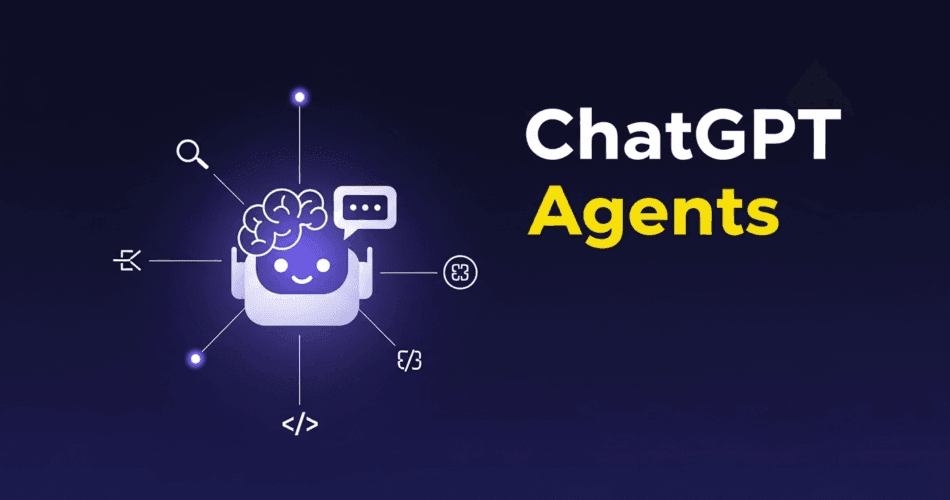I’ve been hearing the term “ChatGPT agents” buzzing around a lot lately. It sounds like something straight out of a sci-fi movie, and I’ve decided it’s time to figure out what all the fuss is about. So, I’m documenting my journey as I explore this new frontier of AI. Let’s see if I can wrap my head around this and maybe even build something cool.
So, What’s the Big Deal with ChatGPT Agents Anyway?
Okay, so from what I’ve gathered, a ChatGPT agent isn’t just your standard chatbot. We’re moving beyond just asking questions and getting answers. Think of it more like a personal AI assistant that you can give a goal to, and it will figure out the steps to achieve it. 🚀
It’s like telling your assistant, “Hey, research the best noise-canceling headphones for under $300 and give me a summary of the top three,” and then it actually goes off and does it. It’s about giving the AI autonomy to complete complex tasks.
How Do These AI Agents Actually ‘Think’?
This is the part that really fascinates me. It’s not magic, even though it sometimes feels like it. From what I can tell, there are a few core components that make these agents tick:
- 🧠 The Brain (A Powerful LLM): At the heart of it all is a large language model (LLM) like GPT-4. This is the reasoning engine that understands your goal and makes decisions.
- 🎯 The Goal: You have to give the agent a clear objective. The more specific, the better.
- 🛠️ The Tools: This is where it gets really interesting. To achieve its goal, the agent needs tools. These can be things like a web browser to search for information, a code interpreter to run calculations, or even access to your calendar or email (with your permission, of course!).
- 🏗️ The Framework: To bring all of this together, you need a framework. Two names that keep popping up are LangChain and Auto-GPT.

My First Steps: Choosing a Framework
After a bit of reading, I’ve decided to start my journey with LangChain. It seems to be a very popular and flexible open-source framework for building applications with LLMs. The name itself gives a clue as to what it does – it lets you “chain” together different LLM calls and tools to create more complex applications.
Auto-GPT also sounds powerful, offering a more autonomous, “set it and forget it” approach. But for now, I want to get my hands dirty and understand the building blocks, so LangChain feels like the right choice.
Getting My Hands Dirty with LangChain
First things first, I need to install it. A simple “pip install langchain” should do the trick.
Now, let’s try a super simple “Hello, World!” equivalent. This is just to see if I can get the basic components working together.
from langchain_openai import OpenAI
from langchain.prompts import PromptTemplate
from langchain.chains import LLMChain
# I need to set my OpenAI API key first
# import os
# os.environ["OPENAI_API_KEY"] = "YOUR_API_KEY"
llm = OpenAI(temperature=0.9)
prompt = PromptTemplate.from_template("What is a fun fact about {subject}?")
chain = LLMChain(llm=llm, prompt=prompt)
print(chain.invoke({"subject": "the moon"}))This simple code snippet creates a prompt template and uses an LLM to generate a fun fact. It’s a small first step, but it’s a start! 🥳
Let’s Build a Simple Research Agent!
Now for the real fun. I want to build a basic agent that can use a search tool to answer a question. This feels like the first real “agent-like” thing to do.
Based on some tutorials I’ve found, here’s how I can approach this.
from langchain_openai import OpenAI
from langchain.agents import load_tools, initialize_agent
from langchain.agents import AgentType
# Again, make sure that OpenAI API key is set
# import os
# os.environ["OPENAI_API_KEY"] = "YOUR_API_KEY"
# You'll also need a SerpAPI key for this to work
# os.environ["SERPAPI_API_KEY"] = "YOUR_SERPAPI_KEY"
# First, I'll initialize the LLM and the tools I want to use.
llm = OpenAI(temperature=0)
tools = load_tools(["serpapi", "llm-math"], llm=llm)
# Now, I'll create the agent. I'm using the ZERO_SHOT_REACT_DESCRIPTION agent type.
# From what I understand, this means the agent will decide which tool to use based on the tool's description.
agent = initialize_agent(tools, llm, agent=AgentType.ZERO_SHOT_REACT_DESCRIPTION, verbose=True)
# Let's give it a try!
agent.run("Who is the current CEO of OpenAI, and what is the company's latest major announcement as of late 2024?")When I run this, I can see the agent’s “thought process” in the output ( verbose=True is super helpful for this!). It identifies that it needs to search the web, uses the serpapi tool, and then formulates an answer based on the search results. How cool is that?!
What About Auto-GPT? Is It Worth a Look?
I haven’t dived into Auto-GPT yet, but from what I’ve seen, it takes the concept of autonomous agents a step further. You give it a high-level goal, and it will generate its own sub-tasks and execute them in a loop until the goal is achieved.

It seems incredibly powerful, but also a bit more complex to set up. For now, I’m happy learning the ropes with LangChain, but Auto-GPT is definitely on my “to-explore” list.
The Fun Part: What Can I Actually DO with These Agents?
The possibilities seem almost endless, but here are a few use cases that have got me really excited:
- 📝 Automated Research and Reporting: Imagine an agent that can research a topic, gather data, and compile it into a detailed report or even a PowerPoint presentation.
- ✈️ Personalized Trip Planning: An agent that can find flights, book hotels, and create an itinerary based on your preferences and budget.
- 📊 Data Analysis: You could have an agent analyze a dataset, identify trends, and create visualizations.
- 📧 Email Management: An agent that can sort through your inbox, prioritize important messages, and even draft replies.
My Final Thoughts and What’s Next on My AI Journey
This initial dive into ChatGPT agents has been mind-blowing. It’s clear that we’re at the beginning of a major shift in how we interact with AI. The move from simple instruction-following to autonomous problem-solving is a huge leap.
I’m still very much a beginner on this journey, but I’m excited to keep learning and experimenting. Next up, I want to try building an agent that can interact with my own documents. The idea of having a personal AI assistant that knows my stuff is just too cool to pass up. Wish me luck! ✨
